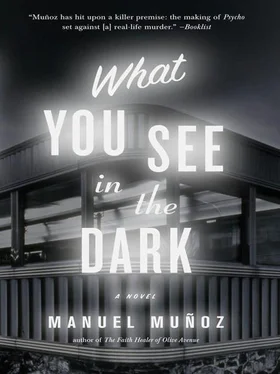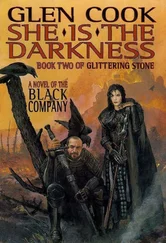Manuel Munoz - What You See in the Dark
Здесь есть возможность читать онлайн «Manuel Munoz - What You See in the Dark» весь текст электронной книги совершенно бесплатно (целиком полную версию без сокращений). В некоторых случаях можно слушать аудио, скачать через торрент в формате fb2 и присутствует краткое содержание. Год выпуска: 2011, Издательство: Algonquin Books, Жанр: Современная проза, на английском языке. Описание произведения, (предисловие) а так же отзывы посетителей доступны на портале библиотеки ЛибКат.
- Название:What You See in the Dark
- Автор:
- Издательство:Algonquin Books
- Жанр:
- Год:2011
- ISBN:нет данных
- Рейтинг книги:5 / 5. Голосов: 1
-
Избранное:Добавить в избранное
- Отзывы:
-
Ваша оценка:
- 100
- 1
- 2
- 3
- 4
- 5
What You See in the Dark: краткое содержание, описание и аннотация
Предлагаем к чтению аннотацию, описание, краткое содержание или предисловие (зависит от того, что написал сам автор книги «What You See in the Dark»). Если вы не нашли необходимую информацию о книге — напишите в комментариях, мы постараемся отыскать её.
—frame by frame, in pans, zooms, and close-ups — Munoz’s re-creation of a vanished era takes the reader into places no camera can go, venturing into the characters’ private thoughts, petty jealousies, and unrealized dreams. The result is a work of stunning originality.
What You See in the Dark — читать онлайн бесплатно полную книгу (весь текст) целиком
Ниже представлен текст книги, разбитый по страницам. Система сохранения места последней прочитанной страницы, позволяет с удобством читать онлайн бесплатно книгу «What You See in the Dark», без необходимости каждый раз заново искать на чём Вы остановились. Поставьте закладку, и сможете в любой момент перейти на страницу, на которой закончили чтение.
Интервал:
Закладка:
“Ready?” she says to Dan, and that says everything to the audience: she will be singing in English, no matter what the sign said. She doesn’t look anything like the picture’s promise, and the Spanish nickname feels misleading. But people came because they had seen her around town with Dan Watson. Or because they knew the woman who had been her mother, or they had heard about how she’d been left to bring herself up all alone after her mother left. They came because this girl was going to sing about either love or pain, and some of them felt as if they already knew the story behind both.
People who don’t know English love that Patsy Cline record from last year, all the times her song came over the radio when there was nothing else to listen to, a deep, luxurious voice for a woman, more expressive than the chirpy girl groups indistinguishable from one another. The guitar starts in and they all recognize the beginning of “Walkin’ After Midnight” and the girl seems to look at the audience straight on, the first words a little quiet and her voice too high. But the couple performs the song well, the girl’s hands shaking a bit before she steadies them on the microphone. She closes her eyes for a long while, as if she needs to concentrate, but then opens them again, as if she knows that she has to face everyone to feel the song. She begins to look around the room as she sings, moving her arms as if she were walking down a Bakersfield street, keeping tempo with the guitar, the song close enough to what everyone has been accustomed to on the radio. Her voice does not have the depth of Patsy Cline’s, dark water swirling, but she manages to make the song tell a kind of story, as if anybody could be walking down the late-night streets of Bakersfield, haunted by that searching, but hopeful about it, no danger whatsoever. People nod their heads along to the guitar’s polite strum, the English words familiar, the way English becomes familiar enough with repetition, her fringe dancing, glittering along.
For the second number, after small but prolonged applause, the girl almost turns her back to them to look at her boyfriend as he begins the first notes. Everyone sees him motion her to turn around, reminding her that she has an audience, and so she positions herself in a sideways posture, a little awkward, but it is clear what is going to happen. She needs to face him, and the notes off the guitar sing to the audience in a prolonged introduction, the melody immediately familiar to some, others needing to wait for the words. It is clear what is going to happen: they are going to sing to each other, her boyfriend a little hidden in the dark, away from the half-moon of the spotlight. And now everyone has something to privately admire: the shape of Dan’s muscular thigh perched off the stool, tapping in tune; the girl’s still-trembling hand on the microphone; Dan’s superb coordination over the guitar strings; the girl’s narrow, beautiful waist. They begin singing the song and right away the people who need the words remember the Everly Brothers and their shiny innocence, their politely combed hair. But tonight, “All I Have to Do Is Dream” comes over as a different song altogether — not two brothers and teenage heartbreak, but a more adult, public affirmation. The girl wavers but stays on the slow, hopeful tempo, watching her boyfriend, who sings back to her in a surprising tenor. This is love. This is what it is supposed to be like — a handsome man and a girl who comes from nothing, and now everything changes because he has arrived. A girl becomes a woman, devoted at last because her man has exhibited the courage to be tender. That’s the way you hear the song, as a shopgirl in a small city, and you see that it all depends on who is listening and why, who grasps a date’s hand in the dark as the song goes on, who knows what the words were actually saying.
Just two songs. Nothing worth the grand pronouncement of an advertisement in the paper. He was a better singer than she was and even played the guitar, but he stands away from the circle of spotlight and allows her to take her bows. “¡Bravo!” call out some of the Spanish-speaking men. “¡Bravo!” As if they understood every word, as if they didn’t notice Dan Watson making a proprietary motion around her delicate waist when she moves toward the back of the cantina. They cheer her all the way out, for just two songs, as if she has fulfilled whatever promise the advertisement in the newspaper suggested, her embrace of the microphone, of them, the dark beauty of her skin, her face, her voice.
After the tables are stacked, the dancing begins, a lot of ballads in both English and Spanish to keep the mood going, the women falling into their men’s arms, heads on shoulders and eyes closed. You do the same to your date, his shoulder too thin to carry your defeat. People could think you were in love with this boy, maybe imagine it was something close to that girl and the bartender, resonant and tremulous. But you can only close your eyes in disappointment that the smell of the neck you’ve nestled into is of Ivory soap, of Prell shampoo and no cologne, one of the Everly Brothers and not that man. Sweet pronouncements have their place, but no man should be singing about a broken heart, about longing. He should be there to fix it, the way Dan sang tonight, the words saying one thing but his thigh on the stool saying another, his longing a stage act because he already has what he desired.
With your eyes closed, you think of what it will be like to go back to work at the shoe store, working alongside that girl, how hard it will be not to seem jealous about every good thing that has come her way. It won’t be long before she quits the job altogether, stepping through the doorway never to return, leaving you to go through the days without any exit of your own.
Your head is heavy on your date’s shoulder. People dance for a short while, but the cantina begins to empty by eleven o’clock. It is a Sunday night after all and tomorrow morning is work. But the routine for the night seems to have been set, more or less. November rolls on and again the same advertisement appears in the paper and the picture begins to make sense to people: La Reina has a story to tell, but you have to listen to the songs she chooses in order to understand it. You have to put a story together against what you might already have heard on the street about her. The songs will tell you how she’s become a queen, has become fit to be treated like one. You have to watch her sing to Dan, and know that he doesn’t care where she comes from or who her family is. People begin to come in more and more, deep into November, on into December, convinced that she’ll sing a song that explains her stage name or even something in Spanish to prove she knows it, the way her boyfriend taps the microphone at the beginning of their two-song sets, “Uno, dos, tres.”
The cold fog settles into Bakersfield, and even in the worst of its thickness, the cars prowl out along Union Avenue and maneuver into the gravel parking lot, ladies shivering in their dresses and short jackets. Maybe tonight she will sing “I Only Have Eyes for You.” Their love is bigger than yours, truer, headed for a certain destination. It is wiping away jealousy and loneliness with nothing but song and sincerity, the simplicity of it almost unfair. You can listen as she sings “Tears on My Pillow,” but the truth of her world makes the song cruel to hear, the will to sacrifice the heart all over again with possibly nothing in return, the heart never forgetting. How could this be true for her? Her boyfriend is right there, even if he is in the dark, and never leaving, so she can sing all the loneliness she wants. It will never touch her.
In December, the ads keep appearing, but with Christmas coming and New Year’s Eve and the general lack of work out in the fields, the cantina begins to slow down a bit. Still, there is the ad, something to look at on a Sunday night when there will be no going out, when the sweet but earnest twenty-three-year-old is left breathless on the phone when he is told no. La Reina opens her soul out on the page, familiar to many now. A hard rain begins that night and lasts all through the morning, steady, the clouds lingering over the Pacific Ocean for days before swirling in. When next week’s edition of the paper is thrown on the doorstep, the paperboy misses his target and it lands in a bush. The paper soaks through. Because there is nothing else to do, the rain keeping everyone indoors, you lay the paper out on the kitchen table to dry in the steamed-up warmth of the house. The ink has run, but parts are salvageable, the news of the entire city spread out for inspection.
Читать дальшеИнтервал:
Закладка:
Похожие книги на «What You See in the Dark»
Представляем Вашему вниманию похожие книги на «What You See in the Dark» списком для выбора. Мы отобрали схожую по названию и смыслу литературу в надежде предоставить читателям больше вариантов отыскать новые, интересные, ещё непрочитанные произведения.
Обсуждение, отзывы о книге «What You See in the Dark» и просто собственные мнения читателей. Оставьте ваши комментарии, напишите, что Вы думаете о произведении, его смысле или главных героях. Укажите что конкретно понравилось, а что нет, и почему Вы так считаете.












